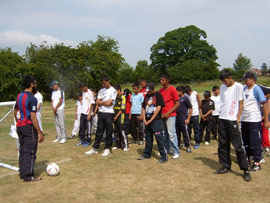Welcome
Whitefield Youth Association, (WYA), is a voluntary group based in Pendle, East Lancashire, it was originally set up by a group of volunteers in 2002 in response to the disturbances that blighted Burnley in 2001.
Whitefield Youth Association helps transform young lives and creates sustainable communities through social action.
Nationally approximately one in five young people in the UK are not in work, education or training. Unemployment amongst young people costs the UK economy £10 million in lost productivity, while youth crime costs £1 billion every year.
Whitefield Youth Association addresses these issues by providing practical support through our tailored designed programmes to those young people who need it the most. Through these programmes we develop key skills, confidence and motivation to enable young people to move into work, education or training.
The main purpose of WYA is to develop and enhance the life opportunities of young people and wider communities that suffer from marginalisation and social economic disadvantage.
We, alongside our partners, deliver programmes that encourage young people to take responsibility for themselves and support them to enhance their social and economic opportunities.
In 2007 WYA managed to secure funding for 3 years through The Henry Smith Charitable Trust to fund the Whitefield Youth Association East Lancashire Community Enhancement Programme.
The aims of this programme are:
- To work with young people that face isolation and segregation, and who are increasingly becoming a negative force and a liability within their communities and localities.
- To build a platform where young people that belong to such groups to be re-engaged in community engagement and provide mechanisms where their views can be heard and where necessary challenged in an objective manner.
- To build the capacity and empowerment of young people that belong to under represented groups in order that they can then contribute to the development and enhancement of their communities and become advocates of positive change.
- To build stronger mechanisms and create better interventions for those at risk of offending or those that have already offended.
- To provide advice, guidance, opportunities and interventions to young people to improve their potential for employment and future lifestyle.



